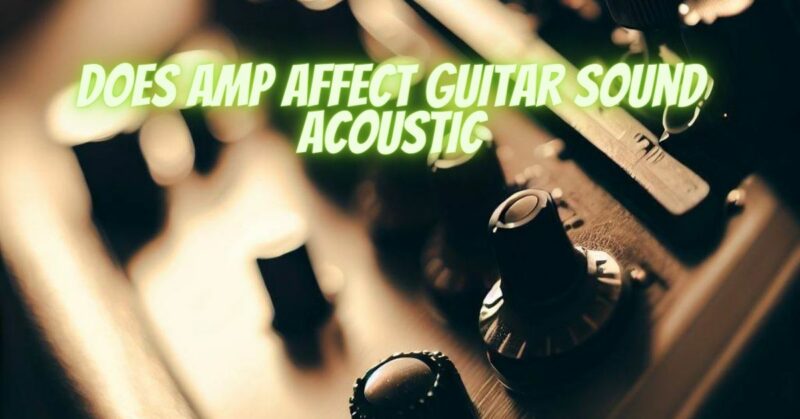When discussing amplifiers, the conversation often revolves around their role in shaping the sound of electric guitars. However, the influence of amplifiers isn’t limited to electric guitars alone. Acoustic guitarists also harness the power of amplification to enhance their sound, open up new creative avenues, and adapt to various performance settings. This article delves into how amplifiers affect the sound of acoustic guitars and their significance in the world of acoustic music.
Amplification for Acoustic Guitars: Why It Matters
Amplifying an acoustic guitar isn’t about drastically altering its natural sound. Instead, it’s about expanding the instrument’s sonic reach while preserving its inherent qualities. Acoustic guitars possess a unique timbre, characterized by their resonance, tonal warmth, and organic sound. Amplification allows these qualities to be projected more effectively in larger venues, ensuring that the nuances of the acoustic guitar’s sound are not lost.
Types of Acoustic Guitar Amplifiers
Amplifiers designed for acoustic guitars come in various forms, each catering to different needs and preferences:
- Acoustic Guitar Amps: These are amplifiers specifically tailored to accentuate the natural characteristics of acoustic guitars. They often include features like EQ controls optimized for acoustic frequencies, feedback suppression mechanisms, and sometimes even effects like reverb and chorus.
- PA Systems: In larger performances or venues, acoustic guitarists may use full PA (public address) systems. These setups consist of multiple speakers and can accommodate multiple instruments and microphones. PA systems are versatile and suitable for solo artists or bands with acoustic instruments.
- Acoustic Preamps/DIs: Acoustic preamplifiers or direct boxes (DIs) are devices that transform the acoustic guitar’s signal into a format suitable for amplification or recording. They can be connected to a PA system, mixer, or studio interface and offer tonal shaping options.
Impact on Acoustic Sound
- Enhanced Projection: One of the primary benefits of amplifying an acoustic guitar is increased projection. The natural resonance of an acoustic guitar can sometimes be lost in larger venues, but amplification ensures that every subtle nuance is heard by the audience.
- Tonal Shaping: Acoustic guitar amplifiers often feature EQ controls that enable players to fine-tune the sound. This is particularly useful in addressing any frequency imbalances that might arise due to the guitar’s tonewoods, body shape, or playing style.
- Effects Integration: Some acoustic guitar amplifiers come equipped with built-in effects like reverb and chorus. These effects can add dimension and ambiance to the sound, enhancing the overall listening experience.
- Feedback Management: Amplification of acoustic guitars can sometimes lead to unwanted feedback due to the instrument’s resonant nature. Many acoustic amplifiers incorporate feedback suppression mechanisms to mitigate this issue.
Preserving the Essence of Acoustic Sound
While amplification expands the sonic possibilities of acoustic guitars, maintaining the instrument’s natural sound is crucial. The goal is not to drastically alter the acoustic guitar’s inherent qualities but to amplify them in a way that resonates with the performer’s intentions.
Amplifiers play a pivotal role in the realm of acoustic guitars, enhancing their sound without compromising their unique character. From tailored amplifiers to versatile PA systems, these amplification solutions empower acoustic guitarists to share their music with a broader audience while staying true to the instrument’s organic timbre. As technology continues to advance, the art of acoustic amplification evolves, enabling musicians to create harmonious connections between their heartfelt melodies and the ears of listeners around the world.


